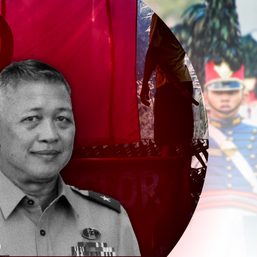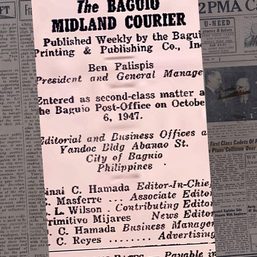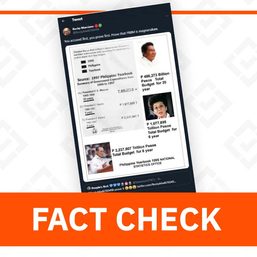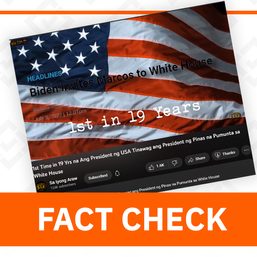SUMMARY
This is AI generated summarization, which may have errors. For context, always refer to the full article.
![[Newsstand] Fidel Ramos and the judgment of history](https://www.rappler.com/tachyon/2022/08/tl-fidel-v-ramos-august-11-2022.jpeg)
The first Washington Post obituary on the late president Fidel V. Ramos, written by Philippine reporter Regine Cabato a few hours after his passing on July 31, concluded with an extended passage from a speech I had written almost a year ago. In it, I asserted before an online forum on presidential legacies that Ramos had “passed the test of time” – by which I meant history had established a firm enough foothold (or beachhead, to use a metaphor Ramos the soldier would have liked) on which to base a favorable judgment of him.
In the judgment of history, Ramos will be ranked among the great for his defense of the constitutional order. I had argued then: “There is no gainsaying his constitutional sense, and his fidelity to it. When I think of the possibilities open to him, during the era of the coup attempts, to choose the other side – which would have completely changed the country’s history – I appreciate all the more that he knew his limits. Constitutionalism is, at its core, about a sense of limits.”
Three moments defined Ramos’ career, and character, as a constitutionalist.
In 1972, he followed the lead of his cousin Ferdinand E. Marcos and implemented martial rule because he understood it as constitutional; he broke with Marcos in 1986 and helped oust him because he concluded that his cousin had betrayed the constitutional order he had created for himself and exceeded its limits; in the late 1980s he defended the Aquino government against repeated coup attempts because it was his duty under the new constitution. It is a mixed record, but he was consistent about constitutional supremacy. Given the extraordinary privilege to redeem his own record from that first moment in history, he made the most of it in the second and third moments – and it is for that role that history will remember him.
He turned out to be a great president, worthy of the office. He changed the country for the better: dismantled monopolies, forged peace with the Moro National Liberation Front, repealed the anti-subversion law. But it is as a hero of the EDSA People Power Revolution and as a defender of democracy that he belongs, rightly, to history.
There were to be sure lingering doubts about his commitment to the constitutional order, especially when he was president. A belated plan to amend the Constitution generated a backlash – but (a) nothing came of it and (b) it turns out he had other succession plans tested out. (One of them involved pushing his economic planning secretary to explore an unlikely technocrat’s run for the presidency.) The skepticism about his commitment to constitutionalism was robust then, and necessary and healthy for democracy; but in the decades since, his reputation as a constitutionalist has only strengthened.
Time’s passage was needed to make a clearing; we needed the distance to more accurately measure his commitment to the constitutional order.
EDSA hero
Like many, I wager, I wouldn’t have gone to EDSA if Ramos were not involved. For many, I’m certain, Ramos’ participation in the EDSA breakaway was essential. When the rumors broke, on Saturday, February 22, that a group of military men had defected from the Marcos regime, my first and most important question must have been similar to that of many others: Was Ramos with them? His presence gave Juan Ponce Enrile and his reformist rebels legitimacy.
It also gave Enrile’s much outnumbered faction its only real chance at survival.
It is important to emphasize, today, just how different Ramos’ reputation was from that of Enrile and the loyal soldiers who gravitated around him. Like other leading personalities in the Marcos regime, Enrile inhabited many roles: in his case, he was defense chief, legal eminence, political kingpin, large landowner, potent rival to Imelda Marcos. The Reform the Armed Forces Movement leaders who orbited around Enrile were seen as combat-hardened but sharing in his greater ambition. Ramos, on the other hand, and despite his long tenure as the commanding general of the notorious Philippine Constabulary, was seen by many, even in the opposition, as the epitome of the professional soldier.
Partly this was the consequence of fame, as a West Point graduate, a combat veteran in two international wars, and the son of an eminent father; partly it was the striking contrast he presented against Fabian Ver, the nobody who had risen to military chief by climbing the ladder attached to Marcos’ backside.
Could Ramos’ training in psychological warfare also help explain his reputation then? Indubitably. But to reformist mutineer and Marcos loyalist alike, Ramos was always the compleat professional. That was his personal reputation; he may have burnished it strategically when Marcos had full control of the media, but it was also and exactly what people said when they dealt with him.
When Marcos discovered the attempted coup against him, Enrile and his men repaired to Camp Aguinaldo to make a last-ditch stand. But crucially, they invited Ramos to join them.
It was Ramos’ presence that convinced many in the opposition, led by Butz Aquino, to march to EDSA. It was Ramos who convinced Enrile and his men to transfer to the much-smaller, easier-to-defend Camp Crame. It was Ramos who convinced the diplomatic community, including the Americans who still had their large military bases in the country, that the rebel military had both legitimacy and a real chance of success. It was Ramos who spent many hours on the phone, talking to various commanders of different military units, convincing them to join the breakaway group. It was Ramos who convinced many on Marcos’ side to welcome Cory Aquino as the new leader; it was Ramos who was convinced that he was seeing something revolutionary in People Power, and celebrated it.
The official tributes from the current national leadership make no mention of it, but without Ramos, there would have been no EDSA.
And without Ramos as chief of staff of the “New Armed Forces of the Philippines” and then as defense secretary, the fledgling post-Marcos government led by Cory Aquino would have collapsed under pressure from the attempted coups launched by some of Ramos’ own partners in EDSA.
I realize that praising Ramos for his consequential presidency is not only right; in the wake of the election of President Ferdinand Marcos Jr., it is politically safe. But he will be counted among the greats because he was a genuine hero of EDSA. – Rappler.com
Veteran journalist John Nery is a Rappler columnist and editorial consultant. He hosts the public affairs program “In the Public Square” every Wednesday.
Add a comment
How does this make you feel?
![[Newspoint] A Freedom Week joke](https://www.rappler.com/tachyon/2024/06/20240614-Filipino-Week-joke-1.jpg?resize=257%2C257&crop_strategy=attention)



![[Bodymind] Forgiveness, Enrile, and Bongbong Marcos Jr.](https://www.rappler.com/tachyon/2024/03/forgiveness-enrile-bongbong-march-6-2024.jpg?resize=257%2C257&crop=411px%2C0px%2C1080px%2C1080px)

![[OPINION] Raised on radio](https://www.rappler.com/tachyon/2024/04/raised-on-radio.jpg?resize=257%2C257&crop=396px%2C0px%2C720px%2C720px)
![[Just Saying] Marcos: A flat response, a missed opportunity](https://www.rappler.com/tachyon/2024/04/tl-marcos-flat-response-april-16-2024.jpg?resize=257%2C257&crop=277px%2C0px%2C720px%2C720px)




![[EDITORIAL] Marcos, bakit mo kasama ang buong barangay sa Davos?](https://www.rappler.com/tachyon/2023/01/animated-marcos-davos-world-economic-forum-carousel.jpg?resize=257%2C257&crop_strategy=attention)

There are no comments yet. Add your comment to start the conversation.